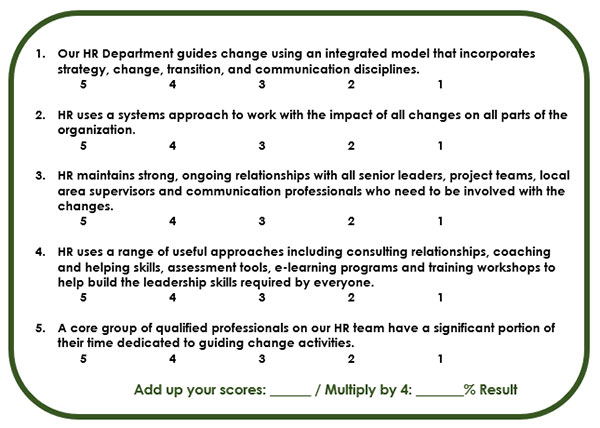Guiding Change – Does HR Add Value?
By Chris Edgelow
What human resources professional isn’t involved with change? HR work lies at the critical intersection of business and people – and that intersection is a very turbulent place these days. Building competency with guiding change is crucial for HR professionals.
The importance of a competency (defined as knowledge in action) is reflected in the following quote – “It’s not what you know that counts. It is what you do with what you know that makes a difference.” Over the years, HR professionals have developed core competencies in areas such as benefits, compensation, labor relations, staffing, employee and organizational development, performance management and diversity.
Those core competencies are no longer enough. The ability to guide change has become increasingly important for HR over the past few decades. While change as a competency has begun to infuse some HR departments, it still has a long way to go in many others.
The fifth round of the HR Competency Study was undertaken by the University of Michigan and RBL group in 2007. This was a global effort involving some 40,000 HR professionals in hundreds of companies located in North America, Latin America, Europe, China, Australia and India. The HR Competency Model they outlined included six competencies, one of which is Culture and Change Steward. They describe the change aspect as developing disciplines to make changes happen throughout the organization.
Why should HR be responsible for guiding change? Isn’t that the responsibility of the project office, the IT department or the senior leaders?
To answer that question, we need to understand the critical difference between guiding change and owning change.
Guiding change involves many activities that assist people to reach a specific destination (successful change), often through unfamiliar territory. Guides help people who plan and implement change understand their roles, learn how to be successful and ensure have the resources they need.
Owning change involves the key leadership roles with the required power and authority to ensure everyone takes the changes seriously. Change owners can hold the system accountable for success.
The only changes that HR owns are the ones HR implements, such as new HR policies, processes and programs. For all other changes, HR must play the guide role.
HR professionals are ideally positioned to be excellent change guides. Here’s why:
- HR has strong connections and ongoing obligations to every part of the organization.
- HR has a natural inclination to consider people first in any changing situation. Changes rarely fail on paper. It is the people issues that cause most of the problems.
- HR typically has a desire to improve situations and to make the organization a better place for everyone involved. That desire is essential when dealing with people and change.
- HR is in a key position to see the complex connections and relationships within the whole organization. This systems view is essential when guiding change.
- Perhaps most importantly, HR is always there. HR can be counted on to coach leaders and provide training and support where needed.
Assessment
Here is a simple assessment outlining five disciplines HR Professionals can develop to ensure they have a strong change competency.
Circle the score (5 is high, 1 is low) based on your understanding of how HR works in your organization:

Based on your result, does your HR department add value when it comes to guiding change? If you were to have others take this quiz, what would their results indicate? If you think there is room for improvement, what are you going to do?
Developing a strong guiding change competency is a vital requirement for HR professionals today. With so much at stake, and the payoffs so great, it’s a competency worth cultivating.
Chris Edgelow is presenting the 7 Lenses for Helping Organizations Change webinar on April 5. For more information on this and other professional development opportunities, please visit cphrbc.ca.
Chris Edgelow is the Founder & President of Sundance Consulting Inc. For more than 30 years he has consulted with a diverse range of organizations around the world in every sector of the economy. Chris developed and has pioneered The Integrated Approach to Leading Change™. He has written and published numerous articles, booklets, workbooks and facilitator guides on a variety of topics relating to helping organizations change. Chris is a member of CPHR BC & Yukon.









